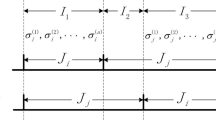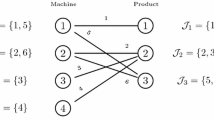Abstract
We study a single machine lot scheduling problem. Customers’ orders may be processed simultaneously in the same lot. The order sizes are assumed to be order-dependent, and the lots have identical size and identical processing time. Orders may be split, i.e., their processing may be performed on two consecutive lots. We assume order-dependent due-dates and weights, and the goal is to minimize the maximum weighted tardiness among all orders. A polynomial time solution algorithm is introduced.
Similar content being viewed by others
Data Availability
All input parameters for the simulations were generated randomly from given distributions.
References
Chen Y, Cheng Y, Zhang G (2020) Single machine lot scheduling with non-uniform lot capacities and processing times. J Combinat Opt 1:1–9
Hou Y-T, Yang D-L, Kuo W-H (2014) Lot scheduling on a single machine. Inf Process Lett 114:718–722
Lawler EL (1973) Optimal sequencing of a single machine subject to precedence constraints. Manage Sci 19(5):544–546
Mor B (2021) Single-machine lot scheduling with variable lot processing times. Eng Optim 53:321–334
Mor B, Mosheiov G (2021) A note on the single machine CON and CONW problems with lot scheduling. J Combinat Opt 42:1–12
Mor B, Mosheiov G, Shapira D (2020) Lot scheduling on a single machine to minimize the (weighted) number of tardy orders. Inf Process Lett 164:106009
Mor B, Mosheiov G, Shapira D (2021) Single machine lot scheduling with optional job-rejection. J Comb Optim 41(1):1–11
Yang DL, Hou YT, Kuo WH (2017) A note on a single-machine lot scheduling problem with indivisible orders. Comput Oper Res 79:34–38
Zhang E, Liu M, Zheng F, Xu Y (2019) Single machine lot scheduling to minimize the total weighted (discounted) completion time. Inf Process Lett 142:46–51
Zheng F, Jin K (2019) An improved heuristic for single machine lot scheduling problem. IFAC-PapersOnLine 52(13):217–222
Acknowledgements
The first author was supported by the Israel Science Foundation (Grant No. 2505/19) and by the Deutsche Forschungsgemeinschaft (DFG, German Research Foundation – Project Number 452470135).
Author information
Authors and Affiliations
Corresponding author
Ethics declarations
Conflict of interest
The authors have no relevant financial or non-financial interests to disclose.The authors have no conflicts of interest to declare that are relevant to the content of this article. All authors certify that they have no affiliations with or involvement in any organization or entity with any financial interest or non-financial interest in the subject matter or materials discussed in this manuscript. The authors have no financial or proprietary interests in any material discussed in this article.
Additional information
Publisher's Note
Springer Nature remains neutral with regard to jurisdictional claims in published maps and institutional affiliations.
Appendix A
Appendix A
Strong NP-hardness of the case of no order splitting.
Theorem
Problem \(1\left|Lot, No-split\right|{T}_{max}^{W}\) is NP-hard in the strong sense even when all the orders share a common due-date and all orders have identical weights.
Proof
We prove by reduction from the strongly NP-hard problem, 3-Partition.
3-partition: Given \(3k\) positive integers, \({a}_{j}, j=1,\dots ,3k\), and a positive integer \(B\) such that \(\frac{B}{4}<{a}_{j}<\frac{B}{2}, j=1,\dots 3k\) and \({\sum }_{j=1}^{3k}{a}_{j}=kB\), does there exist disjoint sets \({A}_{1}, {A}_{2},\dots ,{A}_{k}\) such that \({\sum }_{j\in {A}_{i}}{a}_{j}=B, i=1,\dots ,k\)?
Based on 3-Partition, we create the following instance of P2:
There are \(n=3k\) orders, with processing times \({p}_{j}={a}_{j}, j=1,\dots ,3k\). The size of each lot is \(B\) and the processing time of each lot is 1. There is a common due-date for all the orders: \({d}_{j}=kB, j=1,\dots ,3k\). We show that 3-Partition has a YES answer if and only if the above instance has maximal weighted tardiness of zero.
Assume first that 3-Partition has a Yes answer. Then, there are \(k\) disjoint sets \({A}_{1}, {A}_{2},\dots ,{A}_{k}\), such that \({\sum }_{j\in {A}_{i}}{a}_{j}=B, i=1,\dots ,k\). Schedule each set in a single lot, hence, the orders are processed in exactly \(k\) lots, and the last lot is completed at time \(kB\), implying that there are no tardy orders i.e., \({T}_{max}^{W}=0\).
Assume now that 3-Partition does not have a Yes answer. Then, there must be at least one lot which is not fully used, i.e., the total size of the orders assigned to this lot is strictly smaller than \(B\). It follows that the solution must contain at least \(k+1\) lots, and therefor \({T}_{max}^{W}>0\). \(\hfill \square\)
Rights and permissions
Springer Nature or its licensor (e.g. a society or other partner) holds exclusive rights to this article under a publishing agreement with the author(s) or other rightsholder(s); author self-archiving of the accepted manuscript version of this article is solely governed by the terms of such publishing agreement and applicable law.
About this article
Cite this article
Mosheiov, G., Sarig, A. A note on lot scheduling on a single machine to minimize maximum weighted tardiness. J Comb Optim 45, 128 (2023). https://doi.org/10.1007/s10878-023-01040-7
Accepted:
Published:
DOI: https://doi.org/10.1007/s10878-023-01040-7




